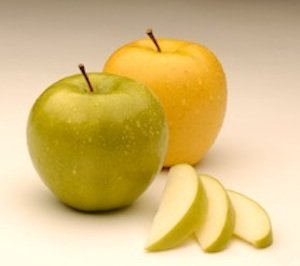Despite protests from many in the apple industry who say the gain is not worth the risk, the process is continuing that could bring Arctic Apples into orchards as early as next year and consumer markets within three years.
Arctic Golden and Arctic Granny are the names of two non-browning apple cultivars that have been produced, using biotechnology, by Okanagan Specialty Fruits, Inc., of Summerland, British Columbia. The parent apples are Golden Delicious and Granny Smith.
On July 13, the U.S. Department of Agriculture’s Animal and Plant Health Inspection Service opened a 60-day period during which people may submit comments. It is part of a new review process that gives two opportunities for public comment.
Neal Carter, founder and president of Okanagan Specialty Fruits, in a phone interview with Good Fruit Grower, said the goal is to obtain a FONSI—a Finding of No Significant Impact—which would allow the apples to come to market in the same non-regulated way all apples are marketed.
In a company press release, Carter said:
“We have approximately 10 years of real-world field trial experience demonstrating that our Arctic trees behave no differently from conventional trees, and that Arctic apples are compositionally and nutritionally similar to conventional apples,” said Carter. “It’s not until an Arctic apple is bruised, bitten, or cut and doesn’t brown that the Arctic difference becomes very clear.”
Arctic apples were created by inserting a reversed orientation version of an apple gene, thus canceling, or “silencing,” the effect of the normal gene. That gene causes an apple to create polyphenol oxidase (PPO), the enzyme the causes browning when the fruit is bruised, bitten, or cut.
“Arctic Golden and Arctic Granny are just our first non-browning varieties,” Carter said. “Any apple variety can be transformed this way.”
In the future, Carter would like to attack apple scab and storage scald in a similar manner. Some apples contain genes for resistance to apple scab, but the breeding process transforms the whole apple. Biotechnology allows introduction of a specific gene, keeping the parent variety otherwise virtually unaltered.
Apple industry organizations have opposed introduction of the non-browning apples. They say browning is not a serious enough issue to risk turning the public against apples, fearing negative consumer reaction to biotechnology.
Carter said he has confidence in the science-based decision-making process APHIS uses in making the determination. “We do anticipate they will be deregulated,” he said. “We have simply turned off an enzyme that spoils the appearance, flavor, and nutrient value of apples.”
While he does not think marketing issues should affect decisions about the safety of Arctic apples, he disagrees that browning is not a serious issue.
“Browning is a huge drag on the apple industry,” he said, noting that restaurants are deterred from serving dishes containing apples because the slices turn brown.
Good Fruit Grower will publish more from the interview with Neal Carter, and industry reaction, in our September issue.
To comment on Okanagan Specialty’s Fruits’ petition, go to the federal rulemaking portal at http://www.regulations.gov/#!documentDetail;D=APHIS-2012-0025-0001. Click on Comment Now.


Leave A Comment